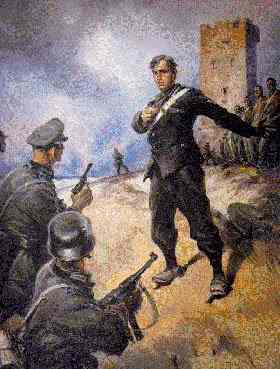 There’s a glib line that “there are no Italian military heroes.” It’s completely wrong. There’s one who stands out in my mind as the epitome of the soldier, a man willing to lay down his life to protect those of others.
There’s a glib line that “there are no Italian military heroes.” It’s completely wrong. There’s one who stands out in my mind as the epitome of the soldier, a man willing to lay down his life to protect those of others.
His name is Salvo d’Acquisto. After Italy surrendered to the Allies in 1943, the Germans took over administration of Italy from Rome northward. In the area where d’Acquisto was stationed, a bomb went off and the Germans didn’t like it. They gathered 23 people to be killed in reprisal. d’Acquisto offered himself in their place, claiming responsibility for the bombing and letting the innocents go free. I must recognize the valor of men and women of Italy who fought against the Nazis and Fascists. Salvo d’Acquisto represents but one story of many, and although people may joke about the Italian army in WW2, the sacrifices of d’Acquisto and others should not be taken lightly, which is why I happily submit this to you all.
In measures of fame and popular acclaim, d’Acquisto has schools and roads and stuff named after him, had movies made about him, and is up for sainthood – I checked at the Vatican website myself. More than that, though, we see a man that realized a solution to a problem was not in killing the enemy, but in allowing the enemy to kill him as a sacrifice to protect others. As I observed Easter services today, my mind went over to how d’Acquisto’s sacrifice was in the manner of Jesus’ sacrifice. He died that others might live. The popular acclaim is there, yes, but what truly makes Salvo d’Acquisto a hero in my eyes is in the way he was able to drink from a bitter cup of sacrifice when there was no other way to save lives.
He was, and is, a true hero. I salute him.